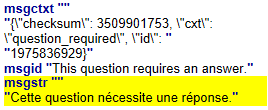Hello everyone,
I've been having some issues with PO files. Our currently PO file type handles PO files without any issue in the sense that we can see and translate content correctly. However, the problem appears when we generate the target files for final delivery to the client. The translated content is not correctly placed between the inverted commas in the PO file. This is what I mean:

This prevents the client to correctly use the PO file.
My current PO file type is this one:

I have checked another threads and I see one recommendation is to use download the extended PO file setting. I have done so:

However, this file setting does not work with my file. I get the following error then trying to use the preview function:

And the following error when I try to create the project.

Which is weird, since the v 1.0.0.0 handles the file just fine.
Is there any way I can solve the issue of the target placed outside the msgstr markers without having to search and replace the file after translation?
Best regards,
Franco Albrecht.
Generated Image Alt-Text
[edited by: Trados AI at 6:06 PM (GMT 0) on 28 Feb 2024]


 Translate
Translate
